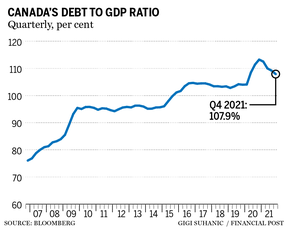風蕭蕭_Frank
以文會友Frank Stronach: Out-of-control government spending hurts average Canadians
Canada 'fairly close' to a debt crisis, warns Magna founder Frank Stronach
加拿大非常接近希臘式破產 從骨子裏感受到債務
據National Post報道,加拿大最大跨國公司之一的創始人Frank Stronach表示,加拿大“非常接近”一場公共債務危機,加拿大人需要迫使政客們控製支出。
他還呼籲立法防止政府的支出超過稅收收入。
麥格納國際公司(The Magna International Inc)的創始人本周為National Post撰寫了一篇專欄文章後,接受了彭博社的采訪。
當被問及加拿大距離1990年代的債務危機有多近時,Stronach說:"我認為很近,你知道,我們的債務每天增加約4億元,對吧?所以這應該是一個很大的擔憂。”
Stronach在他的專欄文章中寫道,加拿大並不能幸免於阿根廷和希臘等國麵臨的破產危機。
“相反,以我們目前的速度,我們正越來越接近這種情況。2021年,加拿大的債務與國內生產總值(GDP)之比約為109%,這與希臘在接受紓困前的比例相同。
換句話說,加拿大欠的錢比我們生產的商品和服務的數量多。這絕不是一個好跡象,”他寫道。
在BNN的采訪中,Stronach舉了一個例子。他1980年代為聯邦自由黨競選後,不得不整頓自己公司的資產負債表。
“我離開了一年,你知道,我想從政,在那期間,Magna的債務增加了大約15億元,按今天的價值計算,大約是150億元。所以我采取了措施,我們在5年後還清了債務。然後我們發布了一項政策,規定公司不允許有任何債務。然後我們積累現金,最後銀行裏可能有10億左右的現金。”

圖源:canadaautonews
Magna是一家為汽車製造商服務的加拿大技術公司,在27個國家擁有342個製造業務和91個產品開發、工程和銷售中心,員工15.8萬人。總部位於安省約克區Aurora。
Stronach呼籲加拿大人遊說立法,防止政府支出超過稅收收入。
他寫道,另一種選擇是經濟崩潰,這將對中低收入階層造成最大的傷害,因為政府會被迫削減社會福利。
Stronach在National Post上寫道:“每個公民都能從骨子裏感受到,這個國家不斷增長的債務是一個問題。”
他說:“我們的政治領導人正把我們推入越來越深的債務之中,我們可能永遠無法償還我們所欠的債務。現在是迫使我們的政治領導人停止入不敷出的時候了。”
Frank Stronach: Out-of-control government spending hurts average Canadians
It’s high time that we forced our political leaders to stop spending more than they take in
Frank Stronach, National Post Mar 22, 2022 • 27 Comments
Every farmer, homeowner and small business owner knows this one inescapable truth: you can’t spend more money than you bring in or you will eventually go bankrupt.
The only group that doesn’t appear to abide by this fundamental law of economics is our politicians, who are pumping out billions of borrowed dollars to prop up our pandemic-ravaged economy. Unless we severely curtail the debt-fuelled spending of the past several years, and unless we start paying it down, we will be headed for trouble. Just paying the interest on the current sky-high debt is the equivalent of swimming with a big cement block tied around our ankles, and the higher our interest payments get, the less money there is in the federal budget for programs like health care.
Because countries are able to print money, they can postpone the process of going broke for a long time. But eventually even countries do go bankrupt, with Argentina being one of the more prominent examples in recent history. That country’s bankruptcy decimated the wealth and savings of millions of citizens. Or consider Greece. Following the economic meltdown in 2010, Greece was rescued with one of the biggest financial bailouts in history, but in turn the country was forced to adopt a number of austerity measures that included higher taxes and reduced pensions for seniors.
Canada is not immune from experiencing the same sort of slide into bankruptcy. On the contrary, at the rate we’re going, we’re moving closer and closer toward that scenario. Canada’s debt-to-GDP ratio in 2021 was approximately 109 per cent — the same percentage as Greece just a few short years before it was bailed out. In other words, the amount of money Canada owes is more than the amount we produce in goods and services. That’s never a good sign.
Governments have the power to raise all the money they need through taxation. So why do governments borrow money? And why do financial institutions not only willingly lend governments money but encourage them to borrow even more? The truth of the matter is this arrangement suits both governments and financial institutions. Banks prefer the safety and security of government bonds over riskier investments in private industry, and governments prefer spending borrowed money rather than raising taxes and risking the wrath of voters. As a result, I believe we need to handcuff the ability of governments to borrow money by lobbying for legislation that will permanently prevent politicians from spending more revenue than they collect in taxes.
In any sort of national economic collapse, like the one that happened in Greece, the wealthy will be hurt the least, since they will have the greatest number of opportunities to protect their assets and move their money to safe havens. The poor and those living on welfare assistance will get poorer, as the state will inevitably have to start cutting social benefits because of falling tax revenues and because a higher percentage of the government budget will have to go toward paying the interest needed to finance the debt.
The middle class will also be hit hard. These are the people who will also have the most to lose, from personal retirement funds and government pensions, to devalued properties, higher tax burdens and reduced buying power. The decline in the value of a country’s currency — one of the inevitable consequences of debt – means a decline in purchasing power, especially for a country that imports most of the products its citizens buy.
But the ones who will hurt most are our children and grandchildren — the people who will be shackled with the obligation to pay back money that we borrowed.
Every citizen can feel deep down in their bones that the country’s growing mountain of debt is a problem. Our political leaders are driving us deeper and deeper into debt and we’re getting to the point where we may never be able to repay the debt we owe. It’s high time that we forced our political leaders to stop spending more than they take in.
There is no escaping the consequences of runaway government spending and debt: one way or another, we will all have to pay for it. In the final analysis, we’re harming our children’s and our grandchildren’s futures.
Frank Stronach is the founder of Magna International Inc., one of Canada’s largest global companies, and an inductee in the Automotive Hall of Fame.
Canada 'fairly close' to a debt crisis, warns Magna founder Frank Stronach
Calls for legislation that would prevent governments from spending more than they collect in taxes
Frank Stronach, founder of one of Canada’s largest global companies, says the country is “fairly close” to a public debt crisis and Canadians need to force politicians to rein in spending.
Who the rate hike will hit the hardest
The Magna International Inc founder was speaking on BNN Bloomberg Wednesday after writing an op-ed for the National Post this week.
When asked how close Canada was to a debt crisis similar to the one that threatened the country in the 1990s, Stronach said: “I think fairly close, you know, our debt rises about $400 million every day, right? So that should be a great concern.”
In his op-ed, Stronach wrote that Canada is not immune to the slide toward bankruptcy seen by other countries such as Argentina and Greece.

“On the contrary, at the rate we’re going, we’re moving closer and closer toward that scenario. Canada’s debt-to-GDP ratio in 2021 was approximately 109 per cent — the same percentage as Greece just a few short years before it was bailed out. In other words, the amount of money Canada owes is more than the amount we produce in goods and services. That’s never a good sign,” he wrote.
During the BNN interview, Stronach used an example of how he had to fix the balance sheet of his own company after he took time off to run for the federal Liberal Party in the 1980s. “I stepped away for a year, you know, I was seeking political office and during that time [Magna’s] debt grew by about a billion and a half, which in today’s dollars, it will be about $15 billion. So I put in [measures] and we had the debt paid up five years later. And then we issued [a policy] that the company wasn’t allowed to have any debt. So we were building up cash — when all was said and done, maybe a billion or so of cash in the bank,” he said.
Frank Stronach: Out-of-control government spending hurts average Canadians
'Bottom line, more spending:' What business leaders think of the Liberal, NDP alliance
Deal with NDP gives Trudeau a majority government in all but name
He is calling for Canadians to lobby for legislation that would prevent governments from spending more revenue than they can collect in taxes.
The alternative is an economic collapse that will hurt the lower and middle classes the most as government is forced to cut social benefits, he wrote.
“Every citizen can feel deep down in their bones that the country’s growing mountain of debt is a problem,” Stronach wrote in the National Post.
“Our political leaders are driving us deeper and deeper into debt and we’re getting to the point where we may never be able to repay the debt we owe. It’s high time that we forced our political leaders to stop spending more than they take in.”





